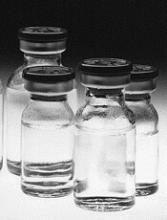A low-intensity regimen could be an effective treatment option for elderly or unfit patients with newly diagnosed acute myeloid leukemia (AML) or high-risk myelodysplastic syndromes (MDS), according to researchers.
The regimen—cladribine plus low-dose cytarabine alternating with decitabine—produced a response rate of 68%.
The median disease-free survival (DFS) was 10.8 months, and the median overall survival (OS) was 13.8 months.
The regimen was considered well tolerated, although all patients experienced myelosuppression, and three-quarters developed infections that may have been treatment-related.
Tapan M. Kadia, MD, of the University of Texas MD Anderson Cancer Center in Houston, and his colleagues reported these results in The Lancet Haematology.
This phase 2 trial enrolled 118 patients with previously untreated AML or high-risk MDS. Seventeen percent of patients had therapy-related AML, 25% had secondary AML (prior MDS or myeloproliferative neoplasm [MPN]), and 15% had treated secondary AML (received treatment for MDS/MPN).
Forty-one percent of patients had an adverse risk karyotype, and 27% had a complex karyotype. Patients had a range of mutations, but the most common were in RAS, TP53, DNMT3a, NPM1, and FLT3-ITD.
Most patients (n=116) were age 60 or older, with a median age of 69. However, there were 2 patients younger than age 60. Both had “extensive” exposure to anthracycline, and one had a prior myocardial infarction.
Treatment
Patients received cladribine plus low-dose cytarabine for two cycles, alternating with decitabine for two cycles, for up to 18 cycles (28 days each).
For cycle 1, patients received cladribine at 5 mg/m² (given intravenously over 1 to 2 hours) on days 1 to 5 and cytarabine at 20 mg (given subcutaneously) twice daily on days 1 to 10.
Patients who achieved remission went on to receive consolidation with cladribine at 5 mg/m² (given intravenously over 1 to 2 hours) on days 1 to 3 and cytarabine at 20 mg twice daily on days 1 to 10, alternating with decitabine at 20 mg/m² (intravenously) on days 1 to 5.
Efficacy
The objective response rate was 68%, the rate of complete response was 58%, and the rate of complete response with incomplete count recovery was 9%.
The median DFS was 10.8 months, and the median OS was 13.8 months. The 1-year OS rate was 64%, and the 2-year OS rate was 28%.
Outcomes were better in patients with a diploid karyotype than in those with adverse karyotypes or TP53 mutation. Among patients with a diploid karyotype (n=38), the response rate was 84%, and the median OS was 19.9 months.
Among patients with adverse karyotypes (n=48), the response rate was 50%, and the median OS was 10.5 months. In patients with TP53 mutation (n=20), the response rate was 40%, and the median OS was 8.9 months.
Of all responders (n=80), 23% went on to allogeneic stem cell transplant. There was no significant difference in OS between patients who received a transplant and those who did not. The median OS was 16.4 months and 15.9 months, respectively (P=0.18).
Safety
The researchers said this regimen was generally well tolerated, but all patients experienced myelosuppression.
The most common non-hematologic adverse events (AEs) considered at least possibly related to treatment included infection (n=88), elevated total bilirubin (n=26), rash (n=13), nausea (n=13), diarrhea (n=9), ALT/AST elevation (n=7), elevated creatinine (n=7), mucositis (n=7), and constipation (n=6).
Overall, grade 3/4 non-hematologic AEs tended to occur in few patients. The exception was infections. There were 77 grade 3 infections, and two grade 4 infections.
There were 9 grade 5 infections but no other fatal AEs considered at least possibly related to treatment.
One patient (1%) died within the first 4 weeks of treatment, and 8 (7%) died within the first 8 weeks. None of these patients had responded.
“Our findings suggest that the combination of cladribine and low-dose cytarabine alternating with decitabine is a highly active and well tolerated regimen for older patients with AML,” the researchers wrote.
The team also called for a phase 3 trial comparing this regimen to hypomethylating agents.
This study was sponsored by MD Anderson and supported, in part, by the National Institutes of Health.


